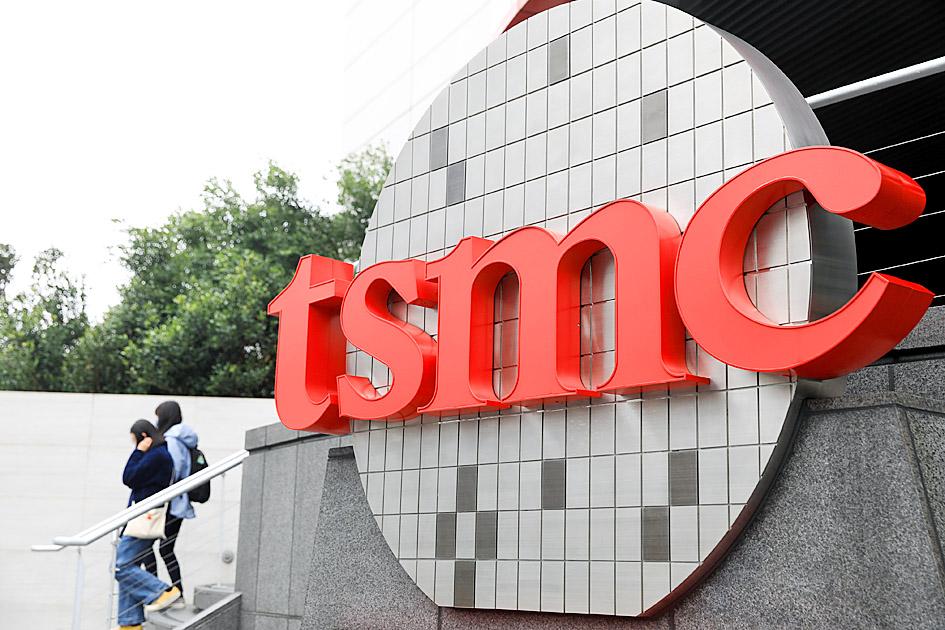Global fab equipment spending at front-end facilities is expected to grow at an annual pace of 10 percent this year to a record of more than US$98 billion, with South Korea taking the lead, followed by Taiwan, SEMI said in a quarterly report yesterday.
That means that world fab equipment spending is to grow for a third straight year, following a 39 percent jump last year and 17 percent growth in 2020, the global semiconductor trade association said in a statement.
The industry previously had three consecutive years of growth from 2016 to 2018, more than 20 years after logging a three-year run in the mid-1990s, SEMI said.

Photo: I-hwa Cheng, Bloomberg
“The semiconductor equipment industry has enjoyed a period of unprecedented growth with increased spending in six of the past seven years as chipmakers expand capacity to meet secular demand for a wide range of emerging technologies, including artificial intelligence, autonomous machines and quantum computing,” SEMI president and chief executive officer Ajit Manocha said in the statement.
“The capacity buildout extends beyond the robust demand during the [COVID-19] pandemic for electronics vital for remote work and learning, telehealth and other applications,” Manocha said.
A bulk of the fab equipment spending is expected to be from the foundry sector, accounting for 46 percent of total spending this year, SEMI said.
The sector is to invest 13 percent more on fab equipment this year than last year, the report said.
The memory sector was next with a 37 percent share, but investment is expected to shrink slightly this year, mostly from DRAM chipmakers, it said.
With Samsung Electronics Co and HK Hynix Inc, South Korea is to be the top spender this year, with fab equipment investment rising 14 percent year-on-year, it said.
Taiwan, which is home to the world’s largest foundry company, Taiwan Semiconductor Manufacturing Co (TSMC, 台積電), ranked No. 2, with fab equipment spending to rise 14 percent annually, SEMI said.
TSMC is expected to unveil another record in capital expenditure for this year today, amounting to US$38 billion, as it has multiple capacity expansion projects under way in Taiwan, China, Japan and the US, Goldman Sachs said last week.
That would be an increase of 26 percent from TSMC’s capital spending budget of US$30 billion last year.
Shares of TSMC’s equipment suppliers Scientech Corp (辛耘), Marketech International Corp (帆宣) and Trusval Technology Co (信紘科技) yesterday rallied 9.71 percent, 2.59 percent and 9.97 percent to NT$113, NT$178.5 and NT$87.1 respectively.
China’s ranking dropped one notch to third this year, with fab equipment spending to contract 20 percent this year from last year, SEMI said.
Europe and the Middle East are projected to grow 145 percent this year from last year, while Japan is expected to grow 29 percent.
SEMI listed 27 fabs and lines that began procuring equipment last year, most of them in China and Japan.
Twenty-five are expected to begin procuring this year, with Taiwan, South Korea and China accounting for most of the activity, it said.

Taiwan Semiconductor Manufacturing Co (TSMC, 台積電) yesterday said that its investment plan in Arizona is going according to schedule, following a local media report claiming that the company is planning to break ground on its third wafer fab in the US in June. In a statement, TSMC said it does not comment on market speculation, but that its investments in Arizona are proceeding well. TSMC is investing more than US$65 billion in Arizona to build three advanced wafer fabs. The first one has started production using the 4-nanometer (nm) process, while the second one would start mass production using the

A TAIWAN DEAL: TSMC is in early talks to fully operate Intel’s US semiconductor factories in a deal first raised by Trump officials, but Intel’s interest is uncertain Broadcom Inc has had informal talks with its advisers about making a bid for Intel Corp’s chip-design and marketing business, the Wall Street Journal reported, citing people familiar with the matter. Nothing has been submitted to Intel and Broadcom could decide not to pursue a deal, according to the Journal. Bloomberg News earlier reported that Taiwan Semiconductor Manufacturing Co (TSMC, 台積電) is in early talks for a controlling stake in Intel’s factories at the request of officials at US President Donald Trump’s administration, as the president looks to boost US manufacturing and maintain the country’s leadership in critical technologies. Trump officials raised the

‘SILVER LINING’: Although the news caused TSMC to fall on the local market, an analyst said that as tariffs are not set to go into effect until April, there is still time for negotiations US President Donald Trump on Tuesday said that he would likely impose tariffs on semiconductor, automobile and pharmaceutical imports of about 25 percent, with an announcement coming as soon as April 2 in a move that would represent a dramatic widening of the US leader’s trade war. “I probably will tell you that on April 2, but it’ll be in the neighborhood of 25 percent,” Trump told reporters at his Mar-a-Lago club when asked about his plan for auto tariffs. Asked about similar levies on pharmaceutical drugs and semiconductors, the president said that “it’ll be 25 percent and higher, and it’ll

CHIP BOOM: Revenue for the semiconductor industry is set to reach US$1 trillion by 2032, opening up opportunities for the chip pacakging and testing company, it said ASE Technology Holding Co (日月光投控), the world’s largest provider of outsourced semiconductor assembly and test (OSAT) services, yesterday launched a new advanced manufacturing facility in Penang, Malaysia, aiming to meet growing demand for emerging technologies such as generative artificial intelligence (AI) applications. The US$300 million facility is a critical step in expanding ASE’s global footprint, offering an alternative for customers from the US, Europe, Japan, South Korea and China to assemble and test chips outside of Taiwan amid efforts to diversify supply chains. The plant, the company’s fifth in Malaysia, is part of a strategic expansion plan that would more than triple